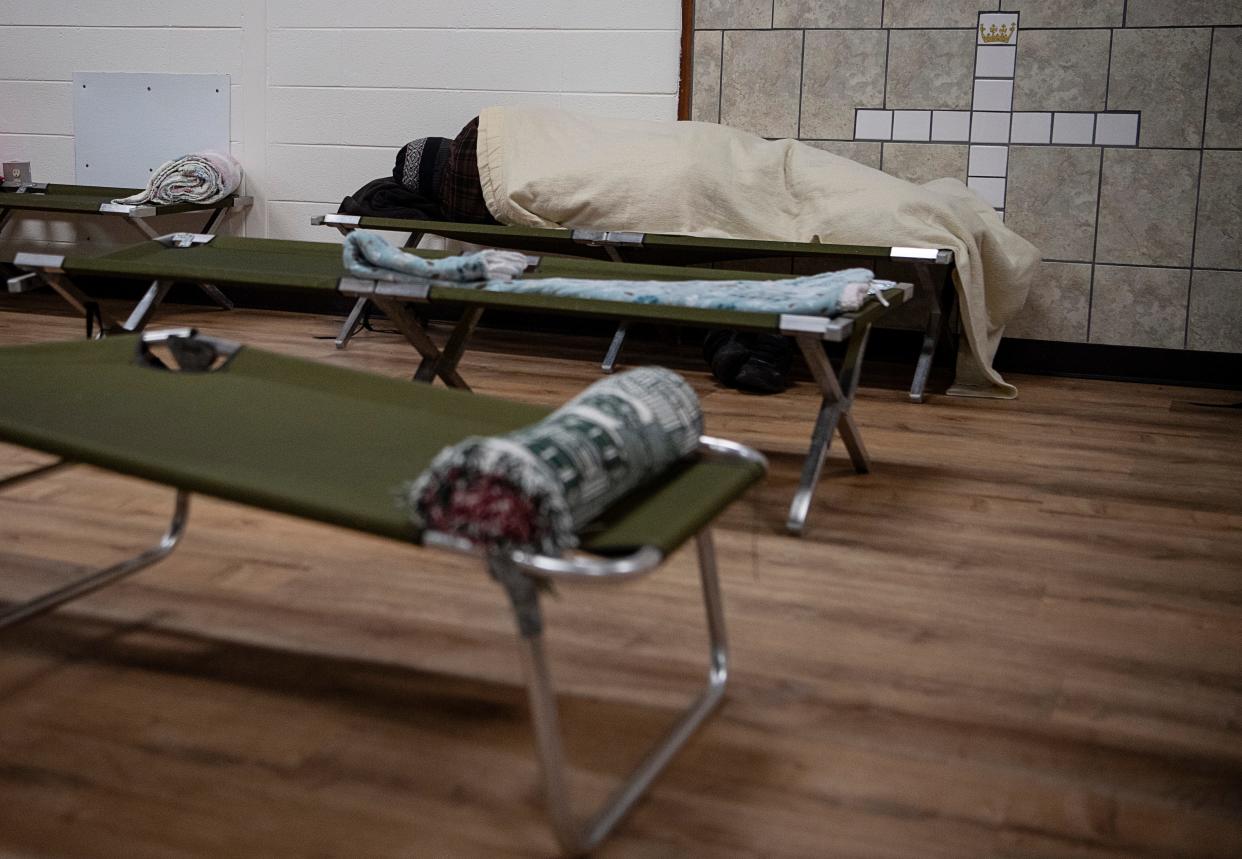Buncombe commissioners OK expansion of low-barrier shelter beds. How many are coming?

ASHEVILLE - With the help of COVID relief dollars, the last of Buncombe County's $50.7 million allocation, the city could be looking at 43 new shelter beds and securing 45 existing beds at risk of closure. But while these efforts represent immediate expansion of available emergency shelter beds, another $3.8 million was earmarked for a potential new project ― which could mean a high-access shelter facility that local officials hope will be a game-changer for the area's homeless population.
"The priority is to create a high access emergency shelter space," board Chair Brownie Newman told the Citizen Times Sept. 6. In addition to the 88 shelter beds to be preserved and created, funded through December 2024, "the $3.8 million is intended to be a new facility that provides a more comprehensive long-term solution."
Buncombe County spokesperson Kassi Day said specifications have not yet been made about the $3.8 million allocation beyond use for housing and shelter, generally.
Both the existing shelter bed expansion, and the pursuit of a new area homeless shelter, were part of unanimous recommendations to the city and county from the Homeless Initiative Advisory Committee, charged with governance of the area's homeless services response.
They requested up to $1.75 million total from both municipalities, which would allow them to create 43 new beds and maintain 45 existing beds between three different area shelters, according to Lacy Hoyle, the county's homelessness program manager, in her Sept. 5 presentation to the board.
It's an $875,000 ask from both city and county. The county approved their funding piece at that same meeting, using leftover American Rescue Plan Act dollars. The recommendation will go to Asheville City Council Sept. 12.

How many beds are needed?
Hoyle said HIAC is also recommending that a shelter planning taskforce be convened by Oct. 16, with the goal of beginning planning for a new permanent shelter, ideally co-located with other central services.
The recommendations were generated by a shelter work group within HIAC, one of the several work groups established in direct response to the most pressing recommendation from the National Alliance to End Homelessness, which gave a report to the city and county in January.
Among the Alliance's recommendations was a call for 95 new beds, increasing the city's shelter bed capacity by 30% — 60 beds for single adults in immediate and low-barrier shelter; 25 beds of enhanced shelter with mental health and substance use specialists onsite; and 10 beds serving families with children.
The three proposals intended to be funded with the $1.75 million are a "pretty good starting point" to meet the recommendation for additional shelter beds, Hoyle said, but a balance of 52 needed beds remain. She noted that the funding would carry the expansion for 15 months only, through December 2024.

Who's getting the $1.75 million?
Pending the city's approval of their piece in the interlocal agreement and funding ask, three organizations will be awarded the funds:
Haywood Street Congregation
Program: Haywood Street Respite
Beds: 3 (new, enhanced beds)
Total cost (for 12 months): $37,400
Trinity United Methodist, Grace Episcopal Church, Grave Covenant Presbyterian Church and Counterflow Asheville
Program: Safe Shelter, a collaboration between the three churches and Counterflow LLC. Targeting underserved communities, such as LGBTQ+ individuals and families with children, the shelter space would rotate monthly between churches.
Beds: 20 (new beds, 10 for families, 10 for singles)
Total cost (for 12 months): $485,500
Salvation Army
Program: Shelter
Beds: 20 (new), 45 (existing).
Total cost (for 12 months): $998,647
Without the funding, Hoyle said the Salvation Army was at risk of losing all 45 of its beds currently in operation.
“They have been heavily reliant on COVID funding in the past several years, and that COVID funding is now coming to an end, and they’re facing the threat of the closure of their facility,“ Hoyle said.
As part of the interlocal agreement, the city will administer the funds by establishing and monitoring contracts with the shelter providers. In the case of Safe Shelter, Grace Episcopal will act as the fiscal agent.
The organizations were initially identified through a request for proposals issued by the shelter work group, which also toured shelters and conducted in-depth interviews both locally and with best-practice high-access shelters across the country.
The group was comprised of Asheville Mayor Esther Manheimer, Buncombe County Commissioner Jasmine Beach-Ferrara, members of the community paramedics, homeless service providers, people with lived experience and more. It was chaired by David Nash, former CEO of the Housing Authority of Asheville and current interim executive director of Homeward Bound.
More: Asheville, Buncombe homelessness board will pursue new, high-access shelter
More: 4 tiny homes framed in 4 days: Volunteers gather for BeLoved Asheville building blitz
Sarah Honosky is the city government reporter for the Asheville Citizen Times, part of the USA TODAY Network. News Tips? Email [email protected] or message on Twitter at @slhonosky. Please support local, daily journalism with a subscription to the Citizen Times
This article originally appeared on Asheville Citizen Times: Buncombe County allocates $875K for homeless shelter bed expansion
